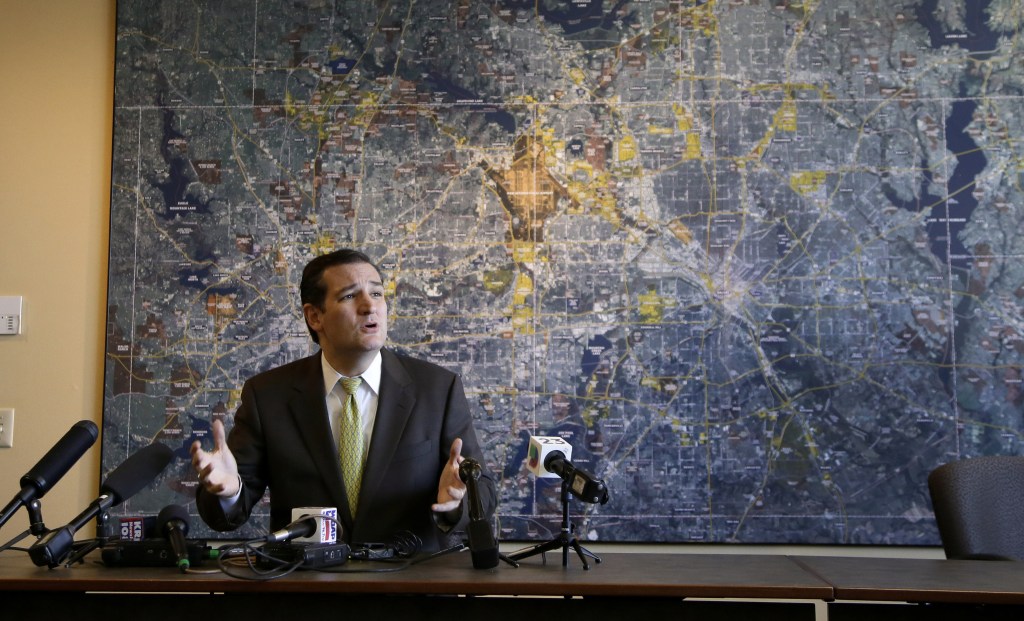DES MOINES, Iowa — Ted Cruz on Friday rolled into Iowa, the always pivotal state in presidential politics, where Republican activists sized him up in the wake of his headline-grabbing role in the Washington standoff over health care that shut down the government.
Fired-up activists packed the downtown Iowa Events Center to celebrate the legacy of iconic hero Ronald Reagan and consider whether Cruz, the renegade Texas senator, could become a worthy apostle.
No matter how much the party’s establishment class criticizes Cruz, no matter how much of an outlier he has become in the U.S. Senate, Republicans in the heartland are intrigued.
“He’s a conservative fighter and he’s really speaking for a lot of little guys whose voices haven’t been heard,” said Iowa Republican chairman A.J. Spiker.
Still, many wanted to hear more before embracing him. “I want to like the guy, but I’m still trying to be sold,” said Ryan Frederick, an Orient, Iowa, real estate appraiser.
Cruz has focused on the Affordable Care Act, which he regards as intrusive, expensive and confusing.
“Due to Obamacare, Americans are losing their health insurance, they are seeing their premiums increase, and many are being forced into part-time work,” he said in a statement Friday. “That won’t change with more salesmanship, a better website or a temporary delay. We must focus our immediate efforts on bringing relief to working people hurt by Obamacare by staying true to health care’s first principle: first do no harm.”
Like its state counterparts around the country, the Iowa Republican Party has been split between those demanding ideological purity and brinksmanship and those urging a more pragmatic, less confrontational approach. Cruz and his allies want to keep fighting the health care law, even if means employing controversial tactics and being blamed for the 16-day federal government shutdown. Others see the battle as one that can’t be won now, as long as Obama stays in office and Democrats run the Senate. The way to win, this crowd argues, is to win elections and install in office like-minded Republicans.
If he did run for the Republican presidential nomination, Cruz likely would face a formidable lineup of potential challengers.
Sen. Rand Paul of Kentucky appeals to this same take-no-prisoners conservative crowd, and he starts with a strong base of support left behind by his father, former Texas Rep. Ron Paul, who ran a respectable third in the 2012 caucus.
Others are also in the mix. New Jersey Gov. Chris Christie hardly appeals to the Cruz-Paul wing, but in a multicandidate field his small but devoted base of moderate support could be enough to win.
Over the next three weeks, prominent Republicans scheduled to visit include 2012 vice presidential candidate Paul Ryan, 2008 vice presidential candidate Sarah Palin, Texas Gov. Rick Perry, Sen. Mike Lee of Utah and former Sen. Scott Brown of Massachusetts.
So far, few if any have tapped the political psyche like Cruz, who also visited Iowa twice this summer. For many, he represents the politician who challenged the reviled Washington way of doing business. His 21-hour talkathon last month, aimed at derailing the Affordable Care Act, was widely viewed by fellow senators from both parties as a fool’s errand. It accomplished nothing and help plunge the government into a shutdown that sent the party’s fortunes sinking.
Cruz is now the face of that shutdown, and it’s costing him. Fellow Republicans this month criticized him at a private Senate luncheon. Sen. Bob Corker, R-Tenn., took the highly unusual step of questioning Cruz’s motives on the Senate floor.
Nationally, a post-shutdown poll by CNN/ORC found Cruz’s favorable rating down to 23 percent, while 42 percent disapproved. The tea party movement’s favorability, which has been roughly in the mid-30s since 2010, was down to 28 percent, and its unfavorable number was twice that.
Send questions/comments to the editors.


